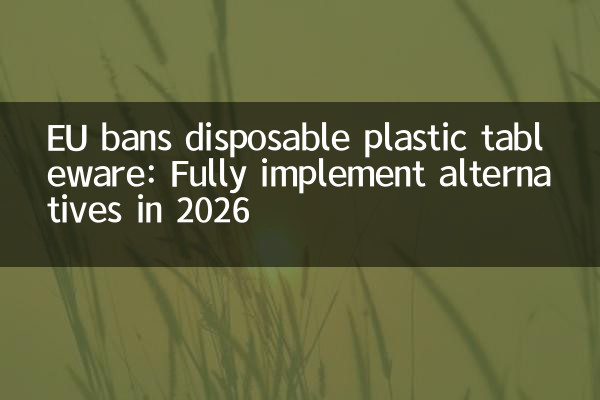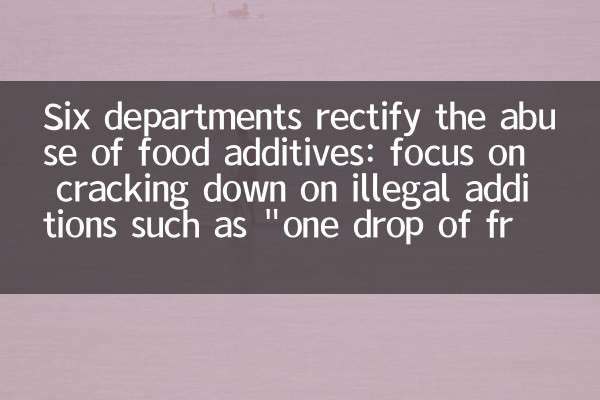EU bans disposable plastic tableware: Fully implement alternatives in 2026
In recent years, the global plastic pollution problem has become increasingly serious. As a pioneer in the field of environmental protection, the EU has once again introduced major policies. According to the latest regulations, the EU will completely ban the use of single-use plastic tableware in 2026 and promote biodegradable and reusable alternatives. This move has sparked widespread discussion around the world, and the following is a detailed interpretation and data analysis of the policy.
1. Policy background and goals

The EU's ban on single-use plastics is another important measure after the 2019 "Disposable Plastics Directive". According to the European Commission, plastic tableware accounts for a large proportion of marine plastic waste, and the ban aims to reduce plastic pollution and promote the development of the circular economy. The following are the relevant data on plastic pollution in the EU in recent years:
| years | Total EU plastic waste (10,000 tons) | Disposable plastic proportion | Source of marine plastic pollution (%) |
|---|---|---|---|
| 2020 | 2900 | 40% | twenty three% |
| 2021 | 3100 | 38% | 25% |
| 2022 | 3300 | 36% | 27% |
As can be seen from the table, although the proportion of disposable plastics has decreased, the problem of plastic pollution is still serious, so the EU decided to speed up the implementation of the ban.
2. Specific content of the ban
According to new EU regulations, the following disposable plastic products will be banned:
| Disable Products | Alternatives | Implementation time |
|---|---|---|
| Plastic tableware (knife, fork, spoon) | Degradable materials or metal tableware | January 2026 |
| Plastic straws | Paper straw or reusable straw | January 2026 |
| Plastic stir bar | Wooden or bamboo stirring rod | January 2026 |
In addition, the EU also requires member states to formulate detailed alternative promotion plans by 2025 and impose high fines on companies that violate regulations.
3. Market response to alternative solutions
With the introduction of the ban, the market demand for biodegradable materials and reusable products has surged. The following are the changes in the EU's biodegradable tableware market size in the past three years:
| years | Market size (100 million euros) | Annual growth rate |
|---|---|---|
| 2021 | 12 | 15% |
| 2022 | 15 | 25% |
| 2023 | 20 | 33% |
It can be seen from the data that the degradable tableware market is growing at a rate of more than 25% per year, and the market size is expected to exceed 5 billion euros by 2026.
4. Reactions from all walks of life
Environmental groups express high support for the EU's decision. "This is a landmark policy that will significantly reduce plastic pollution," said Greenpeace Europe branch head. However, some catering companies expressed concerns that the cost of alternatives is higher and may be passed on to consumers.
At the same time, the European Commission has pledged to provide special funds to support the transformation of small and medium-sized enterprises and encourage the research and development of innovative materials. The following are the EU's capital investment plans in the field of environmental protection in the next five years:
| project | Investment amount (billion euros) | Time range |
|---|---|---|
| Research and development of biodegradable materials | 30 | 2024-2028 |
| Subsidies for small and medium-sized enterprises | 20 | 2024-2026 |
| Public publicity and education | 5 | 2024-2026 |
5. Global impact and future prospects
This EU policy is expected to have a profound impact on the global plastics industry. Many countries have begun to pay attention to EU practices and consider introducing similar policies. Experts predict that by 2030, the global biodegradable tableware market size may reach 20 billion euros.
Despite the challenges, the EU's move has undoubtedly set a benchmark for the global environmental protection cause. With the advancement of technology and the improvement of consumers' environmental awareness, the control of plastic pollution will usher in a new turning point.

check the details

check the details